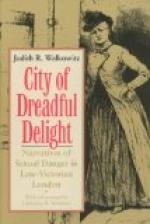“I follow to the Holy City,” the old wayfarer added at last. “The Passover is celebrated there within two weeks. But I shall not fail; nothing will harm me.”
“What talisman do you carry to protect you?” the pagan asked a little irritably.
“No talisman, but the love of Jesus Christ, the Saviour!”
“A Christian!” Aquila exclaimed.
Even through her stupor of grief and hopelessness, Laodice heard this exclamation. Here, then, was one of the Nazarenes, that mysterious sect whose tenets she had never been permitted to hear; But also, she knew that the old apostate had braved the plague and had buried her father. She turned to look at him in time to see him extend his hands in blessing over her.
“The grace of the Lord Jesus Christ and his comfort be with you, for ever; amen. Farewell.”
He was gone. Momus raised her in his arms and, lifting her into her howdah, laid her tenderly on the improvised reclining seat that had been made of the chair therein. In a twinkling the whole party had mounted, and passed swiftly on toward Jerusalem. As they moved forward, the strange woman murmured softly:
“Two!”
Laodice’s camel mounted the slope toward the east and stretched away on a comparative level toward an immense white moon. Aquila’s horse kept up with the matchless speed of the tall camel only at times, and Laodice, dully sensing that they were going at hot haste, realized that a race was on between them and the pestilence. Momus was wielding the goad for a run to the frosts.
A camel raced up beside Aquila.
“Look!” the woman said to him in a lowered tone, showing back over the road by which they had come. Aquila turned in his saddle and looked. Momus rose in his seat and looked. Behind them only one camel rocked along in their wake. The other and its driver had disappeared.
“Deserted!” Aquila exclaimed under his breath.
“Three!” the woman said.
“A pest on your counting for a Charon’s toll-taker!” Aquila whispered savagely. “We will have no more of it!”
“No?” the woman said with a meaning that made the pagan shiver.
Momus laid goad about his camel.
The way continually ascended toward the east; the soil was no longer sandy, but rocky; no longer given up to desolate gardens, but black with groves of cedars and highland shrubs. They swung off a plateau that would have ended in a cliff, down a shaly sheep-path into a wady. Under the moonlight, the bottom was seen to be scarred with marks of hoof and wheel. It debouched suddenly into a Roman road, straight, level, magnificently built and running as a bird flies on to Jerusalem.
The camel’s gait increased. Momus settled himself in a securer position and Laodice, careless of the outcome of this breathless hurry, yielded herself to the careen of her howdah. At times, her indifferent vision caught, through moonlit notches and gaps, glimpses of great blue vapors, crowned with pale fire and piled in glorious disorder low on the eastern horizon. They were the hills encompassing Jerusalem. The stream of wind on her face cooled and drove stronger.




